Critic of the arts - Study guides, Class notes & Summaries
Looking for the best study guides, study notes and summaries about Critic of the arts? On this page you'll find 61 study documents about Critic of the arts.
Page 4 out of 61 results
Sort by
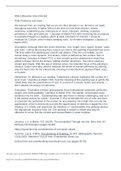
-
HUMN 303 Week 2 Discussion: Critic of the Arts (GRADED A)
- Other • 1 pages • 2022
-
Available in package deal
-
- $10.99
- + learn more
Select any work of art from one of the chapters we have read so far (Ch. 1-4), and write a response that analyzes the art through the lens of a descriptive critic, an interpretive critic, and an evalu ative critic. What different things would these critics have to say? Use the following guidelines: Descriptive Critic: Address at least 3 different elements of art and/or principles of design. Interpretive Critic: This will require research so that you can understand the subject, meaning, and inten...
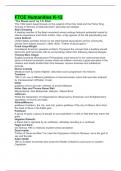
-
FTCE Humanities K-12
- Exam (elaborations) • 20 pages • 2024
-
- $9.99
- + learn more
FTCE Humanities K-12 "The Waste Land" by T.S. Elliot This 1922 poem based loosely on the Legend of the Holy Grail and the Fisher King focuses on themes of disillusionment, absurdity and despair. Allen Ginsberg A leading member of the Beat movement whose writings featured existential mania for intense experience and frantic motion. Also, a big opposer of the US perpetuating war. Louis Sullivan United States architect known for his steel framed skyscrapers and for coining the phrase 'form...
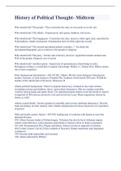
-
History of Political Thought- Midterm Practice Exam
- Exam (elaborations) • 24 pages • 2023
-
Available in package deal
-
- $7.99
- + learn more
History of Political Thought- Midterm Who should rule? The people - They constitute the state, no one needs to revolt, fair Who should rule? The elderly - Experienced, safe-guard, tradition, risk averse Who should rule? The king/queen - Constitutes the state, decisive, birth-right, luck, sanctified by God/tradition, simple mechanism. Fundamental luck for birth-right into royalty Who should rule? The elected (president/cabinet)-excludes..? - Excludes the incompetent/inpopular, gives...
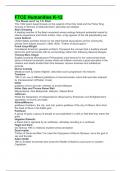
-
FTCE Humanities K-12
- Exam (elaborations) • 20 pages • 2023
-
- $13.99
- + learn more
FTCE Humanities K-12 "The Waste Land" by T.S. Elliot This 1922 poem based loosely on the Legend of the Holy Grail and the Fisher King focuses on themes of disillusionment, absurdity and despair. Allen Ginsberg A leading member of the Beat movement whose writings featured existential mania for intense experience and frantic motion. Also, a big opposer of the US perpetuating war. Louis Sullivan United States architect known for his steel framed skyscrapers and for coining the phrase 'form...
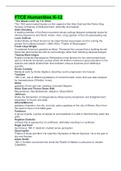
-
FTCE Humanities K-12, Complete Solution
- Exam (elaborations) • 20 pages • 2023
-
- $13.49
- + learn more
FTCE Humanities K-12 "The Waste Land" by T.S. Elliot This 1922 poem based loosely on the Legend of the Holy Grail and the Fisher King focuses on themes of disillusionment, absurdity and despair. Allen Ginsberg A leading member of the Beat movement whose writings featured existential mania for intense experience and frantic motion. Also, a big opposer of the US perpetuating war. Louis Sullivan United States architect known for his steel framed skyscrapers and for coining the phrase 'form...
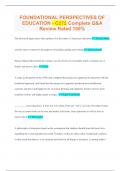
-
FOUNDATIONAL PERSPECTIVES OF EDUCATION - C272 Complete Q&A Review Rated 100%
- Exam (elaborations) • 54 pages • 2023
-
- $9.99
- + learn more
FOUNDATIONAL PERSPECTIVES OF EDUCATION - C272 Complete Q&A Review Rated 100% The historical figure most often spoken of as the father of American education *** Horace Mann schools run by women for the purpose of teaching reading and writing *** Dame schools Horace Mann believed that the country was too diverse to reasonably teach a common set of beliefs and moral values *** False A study in the period of the 1930s that compared the progressive approach to education with the tradition...
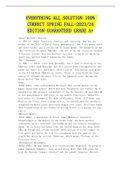
-
EVERYTHING ALL SOLUTION 100% CORRECT SPRING FALL-2023/24 EDITION GUARANTEED GRADE A+
- Other • 293 pages • 2023
-
- $20.39
- + learn more
(Lady) Murasaki Shikibu (c. 978 -c. 1015): Novelist, diarist, and courtesan. She was the author of the Tale of Genji (Genji monogatari), the first known novel; the diary nikki; and a collection of tanka poems. The daughter of the court official Fujiwara Tametoki, she sat in on the classical Chinese literature lessons that her brother received, in spite of the Heian traditions against higher education for women. (Sei) Shonagan (c. 966 - c. 1013): Like Lady Murasaki, was a lady-in-waiting of th...

-
SAT ENGLISH EXAM QUESTIONS WITH CORRECT ANSWERS
- Exam (elaborations) • 30 pages • 2023
- Available in package deal
-
- $12.99
- + learn more
Numberless - Answer too numerous to be counted Immeasurable - Answer beyond calculation or measure Singular - Answer Unique; extraordinary Duplicity - Answer contradictory doubleness of thought, speech or action, especially the belying of one's true intentions by deceptive words or actions Apocryphal - Answer Fictitious; of doubtful authenticity Immutable - Answer Unchanging Marred - Answer Made imperfect; spoiled; disfigured Abject - Answer Of a situation - extremely bad, ...
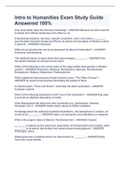
-
Intro to Humanities Exam Study Guide Answered 100%
- Exam (elaborations) • 10 pages • 2022
-
- $9.99
- + learn more
Why must artists make the structure interesting? - ANSWER Because we often respond to artistic form without awareness of its effect on us. Emphasizing simplicity, harmony, restraint, proportion, order, and reason, ________ was the style of ancient Greece and Rome, as well as the foundation of Western culture in general. - ANSWER Classicism What can art provide that cannot be expressed by data and information? - ANSWER Emotional understanding The relational theory of value claims that va...
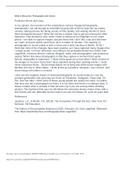
-
HUMN-303 Week 6 Discussion: Photography and Cinema | GRADED A
- Other • 1 pages • 2022
-
Available in package deal
-
- $10.99
- + learn more
For the initial post, address one of the following options: Option 1: In the 19th century, the camera was a revolutionary invention, and many artists were concerned about the effect that photograph s would have on the art world. Did the invention of the camera change the arts? Why or why not? Choose an artistic movement that you believe was influenced by the camera and discuss how the movement was affected. Include at least one example of an artist and artwork in your response. Include a stateme...

$6.50 for your textbook summary multiplied by 100 fellow students... Do the math: that's a lot of money! Don't be a thief of your own wallet and start uploading yours now. Discover all about earning on Stuvia


